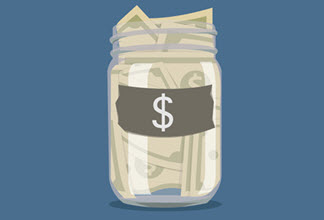TFSA FAQs: Your Questions Answered
Published on January 8, 2021
minute read
Share:
What is a TFSA?
A Tax-Free Savings Account (TFSA) is a registered investment account that allows for tax-free growth of investment income and capital gains from investments held within it. Contributions to TFSAs are not tax-deductible, but withdrawals from your account are tax-free.
What can a TFSA be used for?
You can use a TFSA to save for many different short- and long-term goals, whether you're saving for a car, a home, a renovation or retirement.
Who can open a TFSA?
Any Canadian resident with a Social Insurance Number who has reached age of majority in their province or territory can open a TFSA. Note that the age of majority is 19 in Newfoundland and Labrador, New Brunswick, Nova Scotia, British Columbia, Northwest Territories, Yukon and Nunavut. Contribution room starts at age 18, however, regardless of your province of residence.
What investment choices are available for TFSAs?
Like most investment accounts, you can hold stocks, options, exchange-traded funds (ETFs), mutual funds, bonds and guaranteed investment certificates (GICs) in a TFSA, so long as they are qualified investments.
What is considered a qualified investment for a TFSA?
The Canada Revenue Agency only allows qualified investments in a TFSA. Generally, if a security trades on at least one exchange that's considered a Designated Stock Exchange by Canada's Finance Department, it will be recognized as a qualified investment. Holding non-qualified investments can have tax consequences and may result in penalties levied by the CRA.
Can I buy foreign investments in my TFSA?
If you choose to hold foreign investments in your TFSA, many governments — including the U.S. — apply a non-resident withholding tax to the foreign source income received. Those tax amounts aren't recoverable and may reduce your potential returns. For example, the IRS imposes a 30 per cent withholding tax to dividends paid on U.S. stocks, which can be reduced to 15 per cent by submitting a W-8 BEN or W-9 form. Check with your tax advisor to learn more.
Can I use a TFSA to frequently trade securities?
No. If you're an active trader inside your TFSA - say, dozens of times each year — the CRA may consider you a day trader and could classify the account as a business account. If a TFSA is considered to be carrying on a business, there may be taxes imposed by the CRA.
Is the TFSA margin-eligible?
TFSAs are not eligible for margin and short selling is not permitted.
How is a TFSA different from an RRSP?
- Withdrawals from a TFSA are tax-free and do not result in lost contribution room
- Contributions to a TFSA are not tax-deductible since contribution are made with after-tax dollars
- You don't need earned income to accumulate contribution room in a TFSA
- You don't need to close the TFSA at the end of the year you turn 71
- You can give money to your spouse to contribute to a TFSA without being subject to CRA attribution rules
How much can I contribute each year?
Each year, the federal government determines the annual amount that individuals can contribute to a TFSA.
Your overall annual contribution limit takes into account:
- the government's annual dollar limit
- your unused contribution room carried forward from previous years
- any withdrawals or re-contributions you made in previous years
You can check your contribution room using CRA's My Account. Note: the CRA account details are not real time and only update once a year near the end of February to reflect your prior year's transactions and your current year's dollar limit.
Do I have to have a particular income level to take advantage of a TFSA?
There is no minimum or maximum income level. Every eligible person accumulates contribution room annually.
Do I still accumulate contribution room if I did not open my TFSA when it was first introduced in 2009?
Yes. Find out more in How Much Can I Contribute to My TFSA?
If I don't contribute the maximum one year, can I use my unused contribution room in a future year?
Yes. Your unused contribution room carries forward.
What happens if I over-contribute for the year?
Excess contributions will be subject to a penalty of 1 per cent per month, for each month that the excess amount remains in the account. Investment income and realized capital gains earned on the excess may also be penalized.
You can check your contribution room using CRA's My Account. Note: the CRA account details are not real time and only update once a year near the end of February to reflect your prior year's transactions and your current year's dollar limit.
Is there a lifetime contribution limit?
There is no lifetime limit on the amount of your contributions – you just need to stay within the maximum contribution limits for the years since 2009.
Can I hold multiple TFSAs?
Yes. You can hold multiple TFSAs with one or more financial institutions. Your combined contributions, however, can't go over your personal contribution limit.
Can I withdraw the money I've contributed to my TFSA for any purpose?
Yes. Any withdrawals you make in the current calendar year are added to your unused contribution room. You can re-contribute the amount of your withdrawal beginning in the next calendar year or later.
How often can I withdraw from my TFSA?
You can withdraw funds from a TFSA as often as you need. In your RBC Direct Investing account, you can use the online funds transfer tool.
Are withdrawals subject to income tax?
No. Withdrawals are not considered income for tax purposes. They are tax-free and there is also no impact to your federal income-tested benefits or credits like Old Age Security (OAS), Guaranteed Income Supplement (GIS) or the Age Credit.
If I withdraw money from my TFSA, can I re-contribute this withdrawn amount later on in the tax year?
Withdrawals amounts can be re-contributed, but not until the following calendar year or later.
Can I contribute to my spouse's or common-law spouse's TFSA?
No. However, money you give to your spouse to contribute to his or her TFSA will not be subject to the CRA's income attribution rules.
If I give funds to my spouse to contribute to his or her TFSA, who will get the income — me or my spouse?
Your spouse is the TFSA account holder and the owner of the assets, and therefore is entitled to any investment income and capital gains earned in the account.
Can I contribute assets in-kind from a non-registered account to my TFSA?
Yes. There may be tax implications. When you contribute assets in-kind, you're considered to have disposed of the assets at fair market value (FMV). If the FMV is more than the cost of the property, you need to report the capital gain on your tax return. However, if the cost of the property is more than its FMV, you cannot claim the resulting capital loss. The amount of the contribution to your TFSA will be equal to the FMV of the property.
- Note: If you choose to hold foreign investments in your TFSA, many governments — including the U.S. — apply a non-resident withholding tax to foreign source income. Withholding taxes are unrecoverable, and may reduce your potential returns. For example, the IRS imposes a 30 per cent withholding tax to dividends paid on U.S. stocks – which can be reduced to 15 per cent by submitting a W-8BEN or W-9 form. Check with your tax advisor to learn more.
Can I transfer assets in-kind to a TFSA from an RRSP without tax implications?
No. A TFSA and an RRSP differ in structure and you cannot transfer between them. If you wish to use assets (either cash or securities) from your RRSP to contribute to your TFSA, you must first withdraw the RRSP assets (subject to applicable withholding taxes), move the assets to a non-registered account, and then contribute to the TFSA. Speak to your tax advisor to make sure this is right for you.
Can I use losses within my TFSA to offset other capital gains?
No. You will not pay tax on the investment income and capital gains earned inside the TFSA. Because of this, you can't use losses in the account to offset taxable capital gains outside of the TFSA.
Can I open a joint TFSA account?
No. Government rules permit only individual accounts.
Is interest on money borrowed to invest in my TFSA tax-deductible?
No, interest on money borrowed to invest in a TFSA is not tax-deductible.
How do I open a TFSA?
Visit the Open New Accounts page and follow the instructions for completing an application online.
Which investment minimums will the TFSA follow?
There are no minimums to hold in a TFSA account, but some products like GICs and mutual funds might have a minimum required investment amount.
Is there a U.S. side to a TFSA?
Yes, you can hold and settle trades in U.S. dollars in your TFSA. You can also contribute and withdraw in U.S. dollars if you have an RBC U.S. dollar bank account. In this case, it is the equivalent Canadian dollar value that is recorded for reporting the amounts to the CRA.
Am I required to complete a W-8 BEN form (Certificate of Foreign Status of Beneficial Owner for United States Tax Withholding and Reporting) even if I do not intend to trade in U.S. securities?
Yes. Find out more in What is a W-8BEN Form and Why Does It Matter?
The information provided in this article is for general purposes only and does not constitute personal financial or tax advice. Please consult with your own professional advisor to discuss your specific financial and tax needs.
Next: How Much Can I Contribute to My TFSA?
RBC Direct Investing Inc. and Royal Bank of Canada are separate corporate entities which are affiliated. RBC Direct Investing Inc. is a wholly owned subsidiary of Royal Bank of Canada and is a Member of the Canadian Investment Regulatory Organization and the Canadian Investor Protection Fund. Royal Bank of Canada and certain of its issuers are related to RBC Direct Investing Inc. RBC Direct Investing Inc. does not provide investment advice or recommendations regarding the purchase or sale of any securities. Investors are responsible for their own investment decisions. RBC Direct Investing is a business name used by RBC Direct Investing Inc. ® / ™ Trademark(s) of Royal Bank of Canada. RBC and Royal Bank are registered trademarks of Royal Bank of Canada. Used under licence.
© Royal Bank of Canada 2025.
Any information, opinions or views provided in this document, including hyperlinks to the RBC Direct Investing Inc. website or the websites of its affiliates or third parties, are for your general information only, and are not intended to provide legal, investment, financial, accounting, tax or other professional advice. While information presented is believed to be factual and current, its accuracy is not guaranteed and it should not be regarded as a complete analysis of the subjects discussed. All expressions of opinion reflect the judgment of the author(s) as of the date of publication and are subject to change. No endorsement of any third parties or their advice, opinions, information, products or services is expressly given or implied by RBC Direct Investing Inc. or its affiliates. You should consult with your advisor before taking any action based upon the information contained in this document.
Furthermore, the products, services and securities referred to in this publication are only available in Canada and other jurisdictions where they may be legally offered for sale. Information available on the RBC Direct Investing website is intended for access by residents of Canada only, and should not be accessed from any jurisdiction outside Canada.
Inspired Investor brings you personal stories, timely information and expert insights to empower your investment decisions. Visit About Us to find out more.










